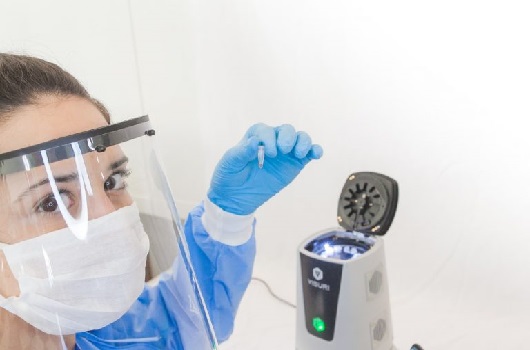Portable device developed by Fiocruz may popularize molecular tests for COVID-19
11/09/2020
Fiocruz Minas
Researchers of Fiocruz and Visuri, reference institutions in research and development of technology for health, have developed a portable device, the OmniLAMP, for the molecular diagnosis of COVID-19 through the detection of SARS-CoV-2 genetic material. Using the RT-LAMP technique, which transforms RNA into DNA and amplifies it isothermically, the equipment makes it possible to run tests with safety levels similar to those of the PCR (polymerase chain reaction) gold standard technique, but in a shorter time and at a lower cost.

The technology enables the decentralization of testing, which can be done in small laboratories, clinics and hospitals throughout Brazil (Photo: Samantha Mapa)
Viral RNA is detected by means of the isothermal amplification of the genetic material of the virus obtained from swabs, both nasal and oropharyngeal. At the end of the reaction, positive samples display a colored exit sign, which is automatically captured and interpreted by the software of the equipment. The system also has GPS and Internet connection. These resources make it possible to store the data in the company’s web servers, for the remote following of what is taking place at each of the devices, whenever they are in use.
The result of the test can be accessed through a smartphone app and is obtained in 30 minutes, unlike other techniques, whose processes of extraction, amplification and data treatment may take up to six hours to yield a result, as the samples require pre-processing. Another advantage of the OmniLAMP is the fact that it requires low-complexity lab structure, and different reagents than those used for the PCR test.
According to Fiocruz Minas researcher, Rubens do Monte, the technology allows for the de-centralization of testing, which can now be carried out in small laboratories, clinics and hospitals all over the country. “As a point of care (PoC) tool, it yields results in an automatic and intuitive fashion, and can therefore be used by personnel with very little training. As a result, the test can get to those who need it the most”, Monte emphasizes. According to Monte, it is important to note that right at the first samples of the clinical trial the sensitivity of the test was 97%, with a specificity of 100%, giving reliability to the actions of whoever employs this innovative portable diagnostic tool.
According to Henrique Martins, CEO of Visuri, the company that co-developed the project, the equipment is fitted with Internet of Things technology, so it is possible to send the results to a web application developed to allow the storage of data in the cloud. “With this system we can follow real time the trend curves and other reports that can be used by government agencies as an auxiliary tool to elaborate strategies against the pandemic”, he explains.
Science by social demand
The OmniLAMP is the result of a public-private partnership. The research began in 2018, followign the approval of the project at the first public call for research of the Serrapilheira Institute. At the time, studies of the RT-LAMP technique had been focusing on the diagnosis of arbovirus diseases (dengue fever, zika, chikungunya) and leishmaniasis. In 2019, the studies could count on resources of the Inova Fiocruz program, and the project was awarded second place as innovative solutions for Brazil at InovaLabs, a pre-acceleration program by Biominas Brasil, in a partnership with Fiocruz. Considering the new global scenario and the great need for Covid-19 tests, in March 2020 the team redirected all its efforts to the detection of SARS-CoV-2. The basic premises of the workforce aimed to adapt the technology in order to come up with an efficient test that was faster, cheaper, and that could be used anywhere in the country.
For virologist Pedro Augusto Alves, a researcher at Fiocruz Minas, diagnostic tools used in small municipalities can direct in a more effective fashion the local and regional epidemiological control. Arbovirus diseases, for instance, are hard to identify with clinical information only, as the symptoms caused by dengue and zika are similar. “Creating a safe and agile test is crucial to define the most suitable type of treatment, when the patient still has symptoms, as this allows for better therapeutic choices and avoids costs with unnecessary treatments”, he explains.
In addition to the funding of the Serrapilheira Institute and the Inova Fiocruz Program, other institutions have also collaborated to develop the OmniLAMP. The study received resources from the Foundation of Research Fomenting of Minas Gerais (Fapemig), of the secretaries of Economic and Health Development of Minas Gerais, of the Financier of Studies and Projects (Finep), and of the Ministry of Science, Technology, Innovations and Communications.
Market
The portable computational device and the test kits are in their final phase of certification by the Brazilian health surveillance agency (Anvisa), equivalent of the Food and Drug Administration (FDA) in Brazil. Ongoing discussions will make sure that once the product is registered, the test kits will be produced by the Institute of Technology in Immunobiology (Biomanguinhos/Fiocruz), one of the manufacturing plants of the Fiocruz in Rio de Janeiro. The portable device will be manufactured by Visuri, in the state of Minas Gerais.
“With a lower cost and an easier execution, when compared with other molecular diagnostic devices, the OmniLAMP is the perfect technology to be used in any municipality, company or environment where there is a need for mass testing, such as airports, for instance, thanks to the easy logistic and usability of the method”, explains Martins.


